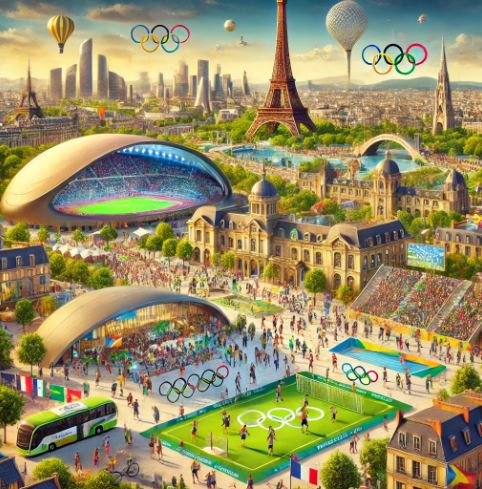The Paris 2024 Olympics promises to be a remarkable celebration of sport, culture, and innovation. Set against the backdrop of one of the world’s most iconic cities, the Games will bring together athletes from around the globe to compete in a spirit of excellence and unity. This comprehensive exploration of the Paris 2024 Olympics will cover various aspects, including the history of the Games, the preparation and infrastructure, the cultural significance, the environmental initiatives, and the potential impact on Paris and the wider world.
A Brief History of the Olympic Games
The modern Olympic Games, inspired by the ancient Greek tradition, were revived in 1896 by Pierre de Coubertin. The first modern Olympics were held in Athens, Greece, and since then, the Games have evolved into the world’s premier sporting event. Paris has a rich history with the Olympics, having hosted the Games twice before, in 1900 and 1924. The 2024 edition marks the centenary of the last Paris Olympics, making it a special occasion for the city and the international sporting community.
The Road to Paris 2024: Bidding and Preparation
The journey to hosting the Olympics is a long and arduous one. Paris faced stiff competition from other cities, including Los Angeles, Budapest, and Rome. The International Olympic Committee (IOC) awarded the 2024 Games to Paris in 2017, recognizing the city’s robust bid and commitment to delivering a sustainable and inclusive event.
The preparation for the Paris 2024 Olympics has been meticulous, involving extensive planning, investment, and collaboration. The French government, in partnership with local authorities and private sector stakeholders, has undertaken significant infrastructure projects to ensure the city is ready to host millions of visitors and athletes.
Key infrastructure projects include the construction of the Olympic Village, located in Seine-Saint-Denis, a northern suburb of Paris. This state-of-the-art facility will house over 15,000 athletes and officials and is designed to be converted into a residential community after the Games, contributing to the city’s long-term urban development plans.
Venues: Blending Tradition with Modernity
One of the most exciting aspects of the Paris 2024 Olympics is the blend of historical and contemporary venues. Iconic landmarks such as the Eiffel Tower, the Champs-Élysées, and the Grand Palais will serve as stunning backdrops for various events, showcasing Paris’s architectural splendor to the world.
The Stade de France, located in Saint-Denis, will be the centerpiece for the opening and closing ceremonies, as well as athletics events. This stadium, originally built for the 1998 FIFA World Cup, has been renovated to meet Olympic standards and provide a world-class experience for athletes and spectators alike.
Other notable venues include the Roland Garros Stadium, known for the French Open tennis tournament, which will host tennis and boxing events, and the Parc des Princes, home to Paris Saint-Germain Football Club, which will host football matches. The use of these existing venues aligns with Paris 2024’s commitment to sustainability by minimizing the need for new construction.
Innovation and Sustainability at the Forefront
Paris 2024 aims to set new standards for innovation and sustainability in the Olympic Games. The organizing committee has placed a strong emphasis on reducing the environmental impact of the event and promoting eco-friendly practices.
One of the key initiatives is the use of renewable energy sources to power the Games. The Olympic venues will rely heavily on solar, wind, and hydroelectric power, reducing the carbon footprint of the event. Additionally, extensive efforts are being made to ensure that all facilities adhere to green building standards, incorporating energy-efficient technologies and sustainable materials.
Transportation is another critical area where Paris 2024 is leading the way in sustainability. The city is expanding its public transportation network, including the construction of new metro lines and the introduction of electric buses and bikes. Spectators and participants will be encouraged to use public transport, cycling, or walking to reduce traffic congestion and pollution.
Waste management is also a priority, with a comprehensive recycling and composting program in place to minimize waste generated during the Games. The organizing committee has set ambitious targets for waste reduction, aiming to achieve zero waste to landfill by the end of the event.
Embracing Inclusivity and Diversity
The Paris 2024 Olympics is committed to promoting inclusivity and diversity, both on and off the field. The Games will feature a balanced representation of men and women athletes, with an equal number of events for both genders. This milestone reflects the ongoing efforts to achieve gender equality in sports and provides a platform for female athletes to showcase their talents on the world stage.
In addition to gender equality, the Paris 2024 Olympics will also celebrate the diversity of the global athletic community. Athletes from all backgrounds, cultures, and abilities will come together to compete, fostering mutual respect and understanding. The Paralympic Games, which will follow the Olympics, will further highlight the achievements of athletes with disabilities and promote accessibility and inclusion in sports.
The Cultural Significance of the Paris 2024 Olympics
Paris is renowned for its rich cultural heritage, and the 2024 Olympics will provide an opportunity to showcase this to a global audience. The Games will be a celebration of French art, music, literature, and cuisine, offering visitors a chance to immerse themselves in the vibrant culture of the host city.
Cultural events and exhibitions will be held throughout Paris, highlighting the city’s history and artistic achievements. The Olympic Torch Relay, a symbolic journey that takes the flame across the host country, will pass through various regions of France, bringing the spirit of the Games to diverse communities and celebrating the nation’s cultural diversity.
The opening and closing ceremonies will be grand spectacles, blending traditional French elements with contemporary performances. These ceremonies will not only mark the beginning and end of the Games but also serve as a reflection of Paris’s artistic excellence and creativity.
The Economic Impact of the Paris 2024 Olympics
Hosting the Olympics has significant economic implications for the host city and country. The Paris 2024 Olympics is expected to generate substantial economic benefits, including job creation, tourism revenue, and long-term investments in infrastructure and development.
The construction and renovation of Olympic venues and facilities have already created thousands of jobs, providing a boost to the local economy. The influx of visitors during the Games will also contribute to the hospitality, retail, and service sectors, with hotels, restaurants, and shops expected to experience increased demand.
Moreover, the global exposure from hosting the Olympics can enhance Paris’s reputation as a premier tourist destination, attracting visitors long after the Games have concluded. The city’s investment in transportation and infrastructure will have lasting benefits, improving the quality of life for residents and supporting future economic growth.
Legacy and Long-Term Benefits
The legacy of the Paris 2024 Olympics extends beyond the immediate economic impact. The Games are designed to leave a positive and lasting legacy for the city and its residents. The Olympic Village, for example, will be transformed into a vibrant residential community, providing much-needed housing and amenities for local residents.
The emphasis on sustainability and green practices will set a benchmark for future events, encouraging other cities to adopt similar measures. The improved transportation infrastructure will ease congestion and reduce pollution, contributing to a healthier and more sustainable urban environment.
Additionally, the Paris 2024 Olympics will inspire a new generation of athletes and sports enthusiasts. The visibility of diverse role models competing at the highest level can motivate young people to pursue sports and physical activities, promoting a culture of health and fitness.
Challenges and Criticisms
Despite the many positive aspects of the Paris 2024 Olympics, there are also challenges and criticisms that need to be addressed. One of the primary concerns is the cost of hosting the Games. The budget for the Paris Olympics is substantial, and there are concerns about potential cost overruns and the financial burden on taxpayers.
To mitigate these risks, the organizing committee has implemented strict budget controls and is seeking private sector partnerships to share the financial responsibilities. Additionally, the use of existing venues and infrastructure aims to reduce construction costs and minimize waste.
Another criticism is the potential for displacement and disruption to local communities. The construction of Olympic facilities and the influx of visitors can impact residents, particularly in areas near the Olympic venues. The organizing committee is working closely with local communities to address these concerns, ensuring that the benefits of the Games are distributed equitably and that any negative impacts are minimized.
Looking Ahead: The Future of the Olympics
The Paris 2024 Olympics represents a pivotal moment in the history of the Games. As the world continues to grapple with global challenges such as climate change, inequality, and public health, the Olympics have the potential to be a powerful force for positive change.
The emphasis on sustainability, inclusivity, and innovation in Paris 2024 sets a new standard for future host cities. The lessons learned from this event can inform the planning and execution of subsequent Olympics, ensuring that they continue to be a source of inspiration and unity for people around the world.
Moreover, the Paris 2024 Olympics will demonstrate the enduring appeal of the Olympic movement, celebrating the values of excellence, friendship, and respect that have defined the Games for over a century. As athletes from diverse backgrounds come together to compete and share their stories, the world will witness the transformative power of sports to bridge divides and foster a sense of global community.
The Paris 2024 Olympics is poised to be a landmark event, showcasing the best of human athleticism, creativity, and innovation. With its rich history, iconic venues, and commitment to sustainability and inclusivity, Paris is set to deliver an unforgettable experience for athletes, spectators, and the global audience.
As the world eagerly anticipates the opening ceremony and the start of the Games, the spirit of the Olympics reminds us of the shared values and aspirations that unite us all. The Paris 2024 Olympics will not only celebrate the achievements of athletes but also inspire us to strive for a better, more inclusive, and sustainable future.






